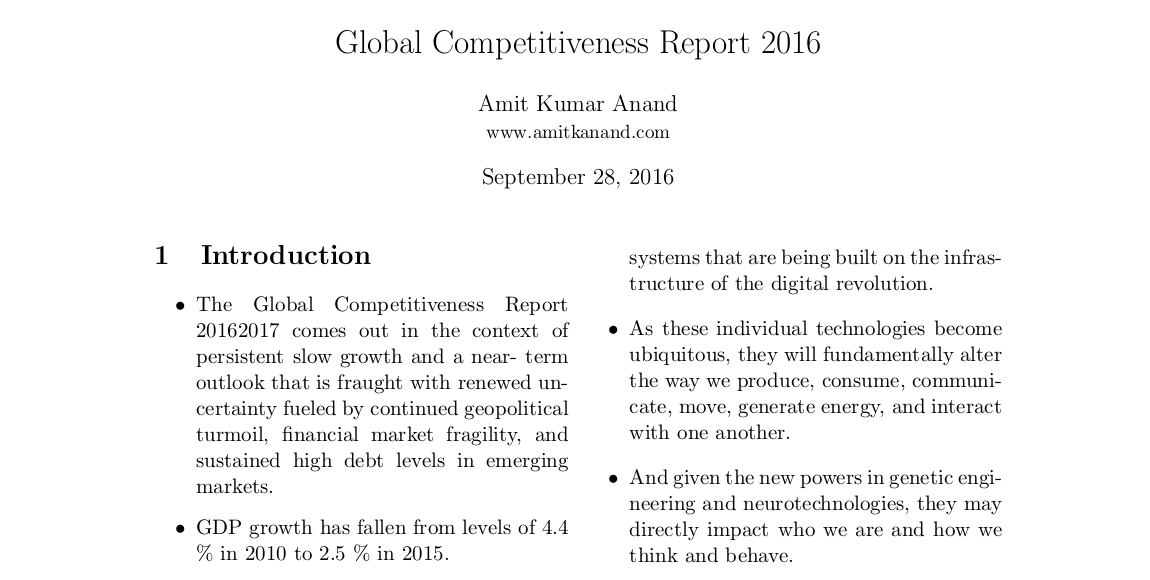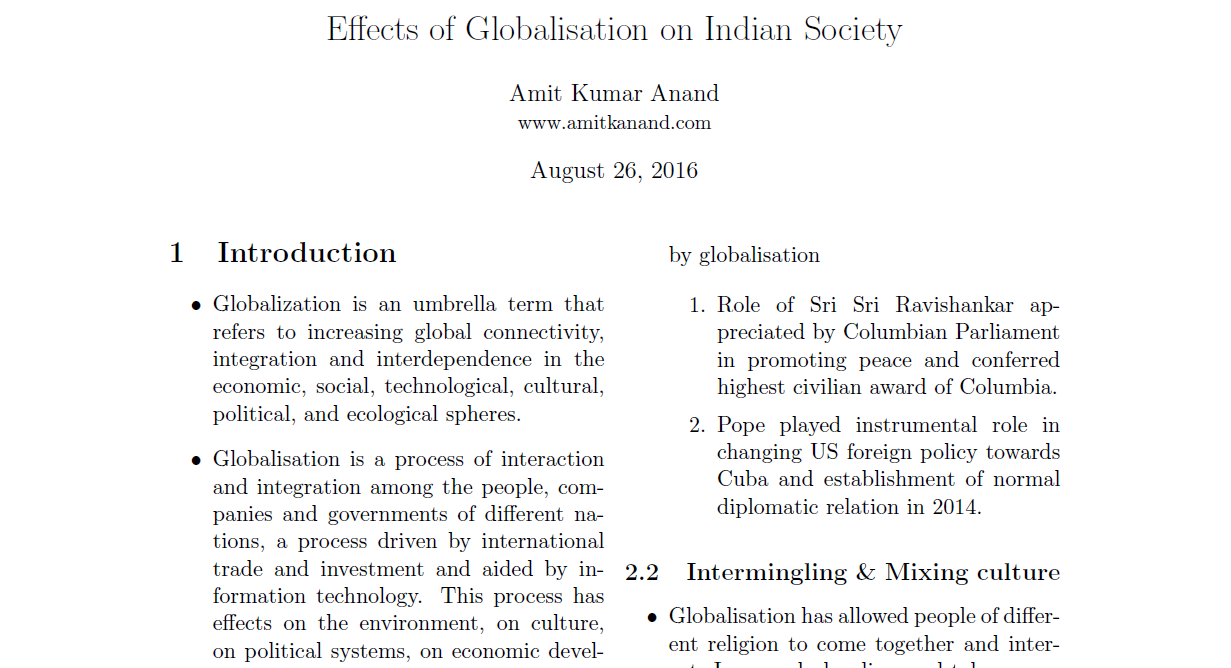 Download from here
Download from here
Tag: India
Higher Education In India [CSE Notes]
 Download from here
Download from here
Effects of Globalisation on Indian Society
I make notes for my CSE preparation. Sharing my note for “Effect of Globalisation on Indian Society”.
Download from here.
Are Anti-India Slogans in JNU justifiable ?
The slogans which were raised in JNU campus on 9th of February were distasteful and cannot be approved in any circumstances. Even Delhi HC in Kanhaiya Kumar’s bail case commented
” The thoughts reflected in the slogans raised by some students of JNU who organised and participated in that programme cannot be claimed to be protected as fundamental right to freedom of speech and expression. I consider this as a kind of infection from which such students are suffering which needs to be controlled/cured before it becomes an epidemic.”
Discussion, debate and advocacy of any issue, however obnoxious it may be, is permitted as per the freedoms granted by our constitution. But support of such ideologies would be promoting sociopathic tendencies in the society. It is very discouraging to the families of soldiers who are dying on the front lines and then see a terrorist been adorned and glamourized. Judgement of Supreme Court of India is been questioned when due process of law is been followed. Afzal Guru was tried as per the law of the land. Questioning the sanctity of the courts of India is not justified. The same SC opened its gate in the middle of the night to hear the petition of Yakub Memon before execution. Tunda is been set free by the court in spite of grave charges levelled against him by the investigative agencies.
Today this issue has taken a totally a different direction. People who should have been questioned, interrogated and should be apologetic have become even more belligerent. Many TV channels and newspaper have diverted the whole discussion to the question of freedom of speech, validity of sedition law in today’s time, veracity of JNU videos, suppression by ruling government, freedom in universities and extreme nationalism. Political parties have taken this issue to target central government instead of condemning anti-India activities organised in the university ultimately compromising the security of the nation and possibly damaging India’s case over J&K in international forums.
Various parties have twisted the issue to suit their objectives. Incidents have been cherry picked to suit their agenda by both the forces of right and left, no one is clean.
Was anti-India slogans raised were correct? Certainly No.
Was such a strict action under sedition law necessary? Maybe not. Police should have authenticated the veracity of videos surfaced first and then should have proceeded.
Was Kanhaiya Kumar’s arrest justified? That is for the court to decide. It should not be decided in some TV channels or by some journalists who certainly have their biases. Kanhaiya is the president of the JNUSU and he was aware of the event and he was also present at the venue. Primafacie he is a suspect, so it isn’t a surprise that police arrested him.
Was Patiala court incident correct? No! The lawyers at the Patiala courts who attacked Kanhiya are hooligans. They are same as the people who shouted anti-India slogans in JNU. They are the two sides of same coin. Extreme versions of right and left ideologies.
Are Patiala court lawyers nationalists? No! they are louts. But certain TV channels and newspapers are using this incident to divert attention from the critical issue of promotion of separatism in Indian universities. They are representing them as the nationalists and then terming the feeling of proudness when we call ourselves Indian or anything which make us feel Indian as extreme nationalism and make an average Indian apologetic for no reason.
Indian justice system may be slow but it takes due care that no innocent is wrongfully convicted. So when a terrorist convicted by the SC is glorified it really baffles us. No one supports violence. No average Indian stands with Patiala court louts. But at the same time no Indian can tolerate bad mouthing of India.
“Bharat tere tukde honge, insha allah allah”, “India Go Back”, “Kitne Afzal maaroge, har ghar se afzal niklega.
These slogans are not characteristics of a saneful discussion or debate rather a promotion of sociopathic tendencies in society which needs to be rectified. Delhi HC has rightly commented in the Kanhiya bail judgement
Whenever some infection is spread in a limb, effort is made to cure the same by giving antibiotics orally and if that does not work, by following second line of treatment. Sometimes it may require surgical intervention also. However, if the infection results in infecting the limb to the extent that it becomes gangrene, amputation is the only treatment.
Is Modi’s Pakistan Policy Directionless ?
PM Modi invited all SAARC heads in his swearing in ceremony including Pakistan’s PM Nawaz Sharif. There was hope for improvement in relations but this was followed by increased border firing. India said it was in response to Pakistan’s ceasefire violations. Pakistan accused India for instigating it. Whatever may be the truth but India’s response was unprecedented. Pakistan faced heavy damage including civilian casualty. Myanmar hot pursuit episode was followed by warning to Pakistani groups of similar response if they tried to attack Indian side challenging the sovereignty of Pakistan. This was followed by reaching agreement over Foreign Secretary level talks at Ufa. But Foreign Secretary level talks met sudden death when Pakistan insisted on meeting separatist groups from Kashmir which was allowed earlier. This time the present government put its foot down and didn’t allowed the meeting. This led to complete lack of communication between India and Pakistan. This was followed by PM Modi’s impromptu visit to Pakistan. India-Pakistan relation have blown hot and cold in the present regime of Indian government hence accused of lack of any consistent policy toward Pakistan and the vision required for improving relations. Individual episodes may give impression that there is no coherent plan but if we analyze the events in totality then we can see a trend. The need to reinvent negotiation position vis a vis Pakistan. Creating visible red lines in relations and deindexing peace talks from terror attacks.
When present government came to power it was felt that there was immediate need to change the negotiation dynamics. In previous UPA government India-Pakistan relations were in limbo. In the ten years of UPA there was minimum interaction with the Pakistan and lack of imagination to engage with Pakistan due to possible backlash from opposition parties. After 2008 Mumbai attacks there was complete halt from Indian side. This fact was exploited by Pakistan to demonstrate rest of the world that it was India which is not serious about improving relations. Also, during this time India came out as a very weak state. Even after beheading of Indian jawans at the border there was lack of appropriate response from the UPA government. Apart from that present NDA government promised strong action against Pakistan in its election promises. So presenting strong stand against Pakistan was necessity of NDA to be congruent with their promises. Next, engagement with Pakistan would require innovative approaches because there are multiple centres of power with complicated relationships. First, is Pakistani army which hold virtual veto in all strategic matters. And improvement in Indo-Pak relations is seen as existential crisis for the army. Hence, Pakistani army seems to be against any moves for betterment of Indo-Pak relations. Second, is Pakistani civilian government. Civilian government of Nawaz Sharif has shown intent for improving relations but lacks ability to go against the army and is dependent on army’s support. Third are the terrorist organisations in Pakistan which are launching attacks against India with the support of Pakistani army.
Therefore, there was need to show India’s intent for improving relations, strengthen India’s negotiation position, get rid of weak state mentality and differentiate between the different centers of power in Pakistan.
India’s positive intent was displayed by PM Modi’s invitation to Nawaz Sharif in his swearing in ceremony. Now the next was to create red lines in relations. Violation of that would be replied commensurately. This was evident from heavy shelling in response to Pakistan’s ceasefire violation, caution to Pakistan after hot pursuit of NSCN(K) terrorists in Myanmar and stoppage of talks over Pakistan’s insistence of meeting separatists from Kashmir. Though India’s response may seemed in these cases over the top but has created negotiation space for the policy makers which was lost earlier. In the art of successful negotiations one has to concede and make other party feel that they too have gained from the negotiation. Therefore there is requirement to have a buffer which could be conceded. Hence, one see ridiculous demands at the start of negotiations and conciliation later to reach an agreement. Similarly, India has created space which it can concede. Baseline cannot be the negotiation line otherwise it would lead to stalemate. (e.g. Unless Pakistan take steps against terrorists there would be no talks.) Next step was to differentiate between the different centers of power in Pakistan. PM Modi’s impromptu visit to Pakistan and visit to PM Nawaz Sharif’s ancestral home is a step in that direction. After Pathankot attacks, evidence were sent to Pakistan for action against terrorists. India has shown faith in the civilian government of Pakistan and is a step to strengthen the civilian government and differentiate civilian government from conspirators and attackers. Terrorists are termed as common enemy to India and Pakistan which working to derail Indo-Pak peace process. Indian government after Pathankot attack has not stopped peace talks and has shown strong resolve to go on with Foreign Secretary level talks and not allow terrorists to derail peace process. This is a move to deindex peace talks from terror attacks so that the gains of peace talks are incremental and cumulative and are not lost due to terrorists activities.
Certainly, PM Modi’s Pakistan policy is not directionless. Even if the Modi’s impromptu visit to Pakistan may seem unplanned but it should be remembered that it was preceded by secret meeting of India and Pakistan NSA at Bankok, Foreign Minister Sushma Swaraj visit to Pakistan for Heart of Asia conference and meeting of PM Modi and PM Sharif in Paris on the sidelines of climate change talks.
